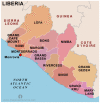Contextualizing Risk Perception and Trust in the Community-Based Response to Ebola Virus Disease in Liberia
- PMID: 33809944
- PMCID: PMC8004115
- DOI: 10.3390/ijerph18063270
Contextualizing Risk Perception and Trust in the Community-Based Response to Ebola Virus Disease in Liberia
Abstract
The 2014-15 Ebola Virus Disease (EVD) outbreaks in Western Africa became widespread in primarily three countries, Guinea, Liberia, and Sierra Leone. Unlike all previous outbreaks in Central and East Africa, which were confined to rural areas, the virus spread rapidly through West Africa as a result of transmission through high-density urban centres coupled with the effects of public distrust in outbreak response teams and local government officials. Objective: In this study, we examine the EVD epidemic in Liberia, the first country to implement a community-based response that led to changes in the trajectory of the epidemic. The focus on the role of community-based initiatives in outbreak response is often neglected in conventional epidemiological accounts. In this light, we consider the manner in which community-based strategies enabled a more effective response based on the establishment of better trust relations and an enhanced understanding of the risks that EVD posed for the community. Methodology: We conducted qualitative research in five distinct communities in Liberia three years after the outbreaks subsided. Data collection procedures consisted of semi-structured interviews and focus group discussions with residents. Results: We found that the implementation of a community-based response, which included the participation of Ebola survivors and local leaders, helped curb and ultimately end the EVD epidemic in Liberia. As community members became more directly involved in the EVD response, the level of trust between citizens, local officials, and non-governmental organization response teams increased. In turn, this led to greater acceptance in abiding to safety protocols, greater receptiveness to risk information, and changes in mobility patterns-all of which played a significant role in turning the tide of the epidemic.
Keywords: Ebola virus disease; Liberia; community engagement; focus group discussion; risk perception; trust.
Conflict of interest statement
The authors declare no conflict of interest. The funders had no role in the design of the study; in the collection, analyses, or interpretation of data; in the writing of the manuscript, or in the decision to publish the results.
Figures


References
-
- Abdullah I., Rashid I. Understanding West Africa’s Ebola Epidemic: Towards a Political Economy. Zed Books; London, UK: 2017. [(accessed on 14 September 2020)]. Available online: http://ebookcentral.proquest.com/lib/utoronto/detail.action?docID=5061869.
-
- Nossiter A. Fresh Graves Point to Undercount of Ebola Toll. [(accessed on 1 January 2021)];The New York Times. 2014 Sep 23; Available online: https://www.nytimes.com/2014/09/23/world/africa/23ebola.html.
-
- Wilkinson A., Leach M. Briefing: Ebola-myths, realities, and structural violence. Afr. Aff. 2015;114:136–148. doi: 10.1093/afraf/adu080. - DOI
-
- Howard A.M. Ebola and Regional History: Connections and Common Experiences. In: Abdullah I., Rashid I., editors. Understanding West Africas Ebola Epidemic: Towards a Political Economy [Internet] Zed Books; London, UK: 2017. [(accessed on 14 September 2020)]. pp. 19–46. Available online: http://ebookcentral.proquest.com/lib/utoronto/detail.action?docID=5061869.
-
- Azétsop J., Lado L., Fosso A.S. Ebola Crisis in West Africa as the Embodiment of the World. Arguing Non-Conv. Epistemol. Dis. Aetiol. 2020;24:30.
Publication types
MeSH terms
LinkOut - more resources
Full Text Sources
Other Literature Sources
Medical
Research Materials

